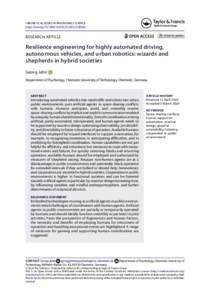Resilience engineering for highly automated driving, autonomous vehicles, and urban robotics: wizards and shepherds in hybrid societies

Theoretical Issues in Ergonomics Science
2024
Early View
1-22
robots ; human-system interface ; artificial intelligence
Technology
https://doi.org/10.1080/1463922X.2024.2328062
English
Bibliogr.
"Introducing automated vehicles into road traffic and robots into urban public environments puts artificial agents in space-sharing conflicts with humans. Humans anticipate, avoid, and smoothly resolve space-sharing conflicts by implicit and explicit communication enabled by uniquely human shared intentionality. Smooth coordination among artificial, partly automated, teleoperated, and human agents needs to be supported by coactive design optimizing observability, predictability, and directability to foster robustness of operation. Available humans should be employed by ‘wizard interfaces' to support automation, for example, in recognizing intentions, in anticipating difficulties, and in predicting for foresighted coordination. Human capabilities are not just helpful for efficiency and robustness but necessary to cope with exceptional events and failures. For quickly removing blocks and resuming operation, available humans should be employed and authorized by measures of ‘shepherd raising'. Because non-human agents are at a disadvantage in public environments and potentially block operation for extended intervals if they are bullied or denied help, benevolence and cooperation are essential in hybrid societies. Cooperation in public environments is higher in functional societies and can be fostered towards artificial agents in particular by coactive design increasing trust, by influencing mindless and mindful anthropomorphism, and further determinants of reciprocal altruism."
Digital
The ETUI is co-funded by the European Union. Views and opinions expressed are however those of the author(s) only and do not necessarily reflect those of the European Union or the ETUI.